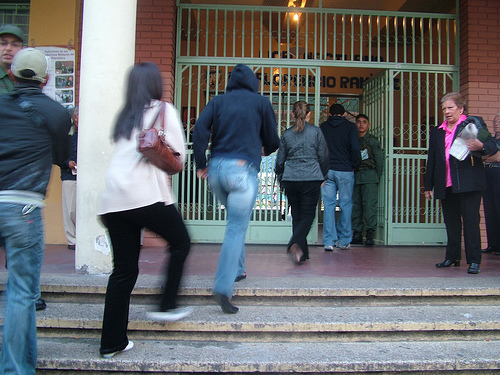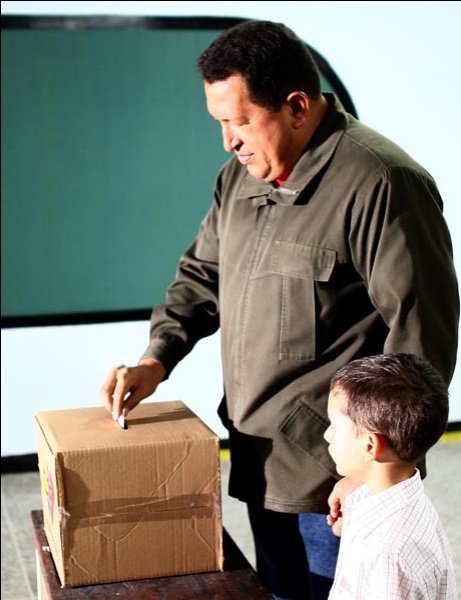Venezuelans Vote Peacefully Over whether to Amend Constitution
- 16 February 2009
Venezuela, February 15, 2009 (venezuelanalysis.com)-- Since the trumpets and fireworks woke up Venezuelans at three o'clock this morning to vote in a national referendum on whether to amend the constitution to abolish the two-term limit on all elected offices, the electoral process has been tranquil, democratic, and efficient in nearly every region of Venezuela, with few irregularities reported.

On December 1 President Hugo Chavez called on his party, the United Socialist Party of Venezuela (PSUV) to campaign for the constitutional change, at first just proposing that the limit be withdrawn from the position of president. In January the national assembly approved the change, adding that it be applied to all elected positions, and then put it to a general referendum.
According to the National Electoral Council (CNE), all voting centers were open by 9am. Voting centers are meant to be open at 5.30am, and must stay open until 6pm or later if there still are people waiting in line.
Chief of the military’s Strategic Command Operation for the elections, Jesus Gonzalez, said that voting had begun with “completely normality, except for a few exceptions.” He said one person had been detained for breaking one of the voting machines.
In the capital city of Caracas, people with purple indelible ink-dyed fingertips, signaling that they had voted in the early morning, walked their dogs, read books in the park, played happily with their children, and listening in groups to reggaeton or salsa music.
When inquired about their feelings about the referendum, most Venezuelans said the voting machines were quick and easy, and they encouraged their fellow citizens to exercise their democratic rights.
“This is our duty to the country, to come out and vote. It is our life, our country, our process,” said one woman in the La Pastora neighborhood. A man waiting in a short line nearby commented, “Everyone should come and fulfill their duty to the country, independent of their political position, come vote and combat abstention.”
Observers reported that there were very few long lines with fifty or more voters, while notably short voting lines were very prevalent in the capital city as well as other major cities, including Mérida, San Cristobal, Maracaibo, and Maracay. Government officials said this is because Venezuelans are only voting on a single, yes-or-no question.
People in the street, in both upper class neighborhoods as well as low-income barrios, told Venezuelanalysis they expect most people to vote in the late afternoon, perhaps because they had been up late celebrating Valentine's Day last night.
The National Guard and other security officers maintained a well-marked security perimeter around voting centers, and treated voters and observers with utmost courtesy, using neutral language and displaying knowledge of the electoral norms laid down by the National Electoral Council (CNE).
In Mérida a truck playing the reveille bugle call traveled around the city from 3am until about 7am, to wake up voters and voting booth attendees.
In one voting center in a small primary school in Belen, a small line had formed by 6.30 am, while at a larger center in the city center, Libertador High School, there were long lines of 10-15 people per voting room (with 12 voting rooms in the school, assigned according to identification number). By afternoon there were few people in the lines.
The voting process was identical to that of the regional elections in November last year. The National Guard arrived from 4am, and was responsible for managing the lines at the various stages and checking ID’s before people went inside.
Inside, people formed new lines, sitting down patiently. From there 3 or 4 people lined up outside their voting room until they were let in. They showed their identification at a table, put their fingerprints next to their name, were asked if they knew how to vote, then went behind a cardboard screen to the computer, where they marked their vote on a touch screen. The computer printed out a hard copy of their vote, which they placed in a ballot box. Finally, they dipped their small finger in indelible ink.

The head of each voting room asked the voter, “Do you know how to vote?” and “You have two options, choose one.”
All voting center workers were patient, helpful, did not rush voters, and used very neutral language when giving instructions. Likewise, voters were calm, cheerful, keen, and disciplined.
“Yes, its all going well, I hope everyone comes out to vote to decide for our country,” said Quina Quintero, from Merida.
“I voted ‘No’, it was quick, much quicker than last time,” said Oliverio Picon.
“It’s fabulous, great, very fast, very good. Yes it’s important that everyone vote, the whole thing is totally democratic,” said Eliana Molina.
This referendum is the second ever totally automated national election in Venezuela, out of a total of 13 electoral cycles the country has undergone since Chavez was elected ten years ago.
In contrast to previous elections, this voting day has been marked by relatively few acts of politically motivated violence. The only major incident of violence was a burglary and vandalism of the social work school at the Central University of Venezuela (UCV) in Caracas early this morning. Burglars identifying themselves as members of the opposition group Bandera Roja broke windows, set fire to paperwork, broke furniture, and spray painted “No means No,” and anti-amendment slogan, on the walls.
Eleven people have been detained in the state of Tachira, for public disorder near a voting center. They will receive warnings.
Opposition observers have made one public complaint, as the pro-Chavez governor of Anzoategui, Tarek Saab voted a second time after his first vote was nullified.
Early in the morning, voters in a few voting centers had reported that the machine had registered a null vote, signaled by a blank voting receipt, when they had intended to vote yes or no on the amendment. Promptly, CNE President Tibisay Lucena announced on national television that voters should be sure a check mark appears to the left of their choice before pressing the vote button on the machine.
There are 16,767,511 registered voters, 11,422 voting centers in addition to 126 voting centers in overseas embassies and consulates.
James Suggett reporting from Caracas and Tamara Pearson reporting from Mérida.